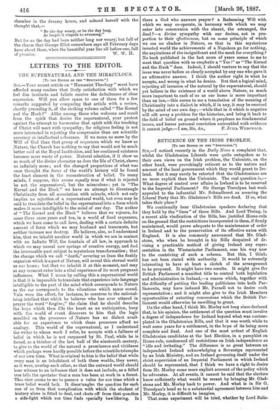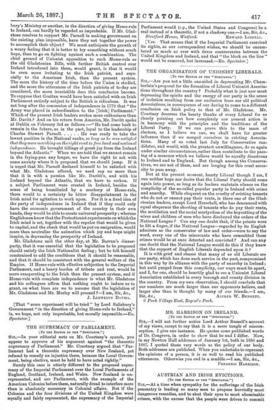RETICENCE ON THE IRISH PROBLEM.
(To TH. Boma or TEM ..SPECTLTO9.1 Stn,—I noticed recently in the Daily News a complaint that, whilst the Gladstonian Liberals were quite outspoken as to their own views on the Irish problem, the Unionists, on the other hand, were provokingly reticent as to the nature and amount of the local government which they would grant to Ire- land. Bat it may surely be retorted that the Gladstonians are no more explicit than the Unionists. The real question is,— What degree of control over affairs in Ireland is to be reserved to the Imperial Parliament? Sir George Trevelyan last week appealed to the influential Mr. Scbnadhorst as assuring the Liberal Party that Mr. Gladstone's Bills are dead. If so, what takes their place P
We continually hear Gladstonian speakers declaring that they hold by the "lines" of those Bills. And Lord Thring, in a recent able vindication of the Bills, has justified Home-rale on the ground that the restrictions incorporated in them, if firmly maintained, would prove adequate to the maintenance of order in Ireland and to the preservation of its effective union with England. It is also commonly announced that Mr. Glad- stone, who when he brought in his Bills despaired of de- vising a practicable method of giving Ireland any repre- sentation in the Westminster Parliament, sees his way now to the contriving of such a scheme. Bat this, I think, has not been stated with authority. It would be extremely interesting to have at least a sketch of the arrangement to be proposed. It might have two results. It might give the British Parliament a manifest title to control both legislation and administration in Ireland,—a reason which, together with • the difficulty of putting the leading politicians into both Par- liaments, may have induced Mr. Parnell not to desire such representation ; and it might also give to the Irish Members opportunities of extorting concessions which the British Par- liament would otherwise be unwilling to grant.
On the other hand, I think Mr. Morley not long since declared that, in his opinion, the settlement of the question mast involve a degree of independence for Ireland beyond what was contem- plated in the Gladstonian Bills, and that it was worth while to wait some years for a settlement, in the hope of its being more complete and final. And one of the most ardent of English Gladstonian candidates at the last Election, in a pamphlet on Home-rule, condemned all restrictions on Irish independence as "idle and irritating." The difference is so great between an independent Ireland acknowledging a Sovereign represented by an Irish Ministry, and an Ireland governing itself under the strict supervision of an Imperial Parliament in which Ireland should be represented, that I think we have a right to desire from Mr. Morley some more explicit account of the policy which he advocates. At all events, it cannot be said that the electors know sufficiently what would be meant by bringing Mr. Glad- stone and Mr. Morley back to power. And what is in Sir G. Trevelyan's head as to a substantial agreement between him and Mr. Morley, it is difficult to imagine.
That some experiment will be tried, whether by Lord Salim- bury's Ministry or another, in the direction of giving Home-rule to Ireland, can hardly be regarded as improbable. If Mr. Glad- stone resolves to support Mr. Parnell in making government on the existing plan impossible, have they not together the power to accomplish their object P We must anticipate the growth of a weary feeling that it is better to try something without much hope, than to go on fighting against such a combination. The chief ground of Unionist opposition to such Home-rule as the old Gladstonian Bills, with further British control over Ireland introduced into them, would grant, is that it would be even more irritating to the Irish patriot, and espe- cially to the American Irish, than the present system. The more the history of the time before the Union is studied, and the more the utterances of the Irish patriots of to-day are considered, the more irresistible does this conclusion become. To suppose that Grattan would have been satisfied with an Irish Parliament entirely subject to the British is ridiculous. It was not long after the concession of independence in 1778 that "the Army was placed in subordination to the [Irish] Parliament." Which of the present Irish leaders evokes more enthusiasm than Mr. Devitt P And on his return from America, Mr. Devitt spoke at Dublin on February 3rd as follows :—" He had come back to remain in the future, as in the past, loyal to the leadership of Charles Stewart Parnell He was ready to take the lowest position in the National ranks, so long as he was satisfied that they were marching on the right road to free land and national independence. He brought tidings of great joy from the Ireland beyond the Atlantic." When we are told that we cannot remain in the frying-pan any longer, we have the right to ask with some anxiety where it is proposed that we should jump. If it is urged that Mr. Parnell declared himself to be satisfied with what Mr. Gladstone offered, we need say no more than that it is with a passion like Mr. Davitt's, and with his Ireland beyond the Atlantic, that we have to reckon. If a subject Parliament were created in Ireland, besides the sense of being humiliated by a mockery of Home-rule, there would to a certainty be bitter disappointment in the Irish mind for agitation to work upon. For it is a fixed idea of the party of independence in Ireland that if they could only have the economic government of the country in their own hands, they would be able to create universal prosperity ; whereas Englishmen know that the Protectionist experiments on whichthe Irish mind is set, together with the repulse that would be given to capital, and the check that would be put on emigration, would snore than neutralise the animation which joy and hope might inspire, in depressing the prosperity of Ireland.
Mr. Gladstone said the other day, at Mr. Barran's dinner. party, that it was essential that the legislation to be proposed should satisfy the Irish Nationalist feeling ; but he felt himself constrained to add the conditions that it should be reasonable, and that it should be consistent with the general welfare of the Empire. If Home-role with effective subjection to the Imperial Parliament, and a heavy burden of tribute and rent, would be more exasperating to the Irish than the present system, and if Home-rale with complete independence is what Mr. Gladstone and his colleagues affirm that nothing ought to induce us to grant, on what lines are we to assume that the legislation of Mr. Gladstone and Mr. Morley will proceed P-1 am, Sir, &c., J. LLEWELTN DAvirs.
[That " some experiment will be tried " by Lord Salisbury's Government "in the direction of giving Home-rule to Ireland," is, we hope, not only improbable, but morally impossible.—En. Spectator.]















































 Previous page
Previous page